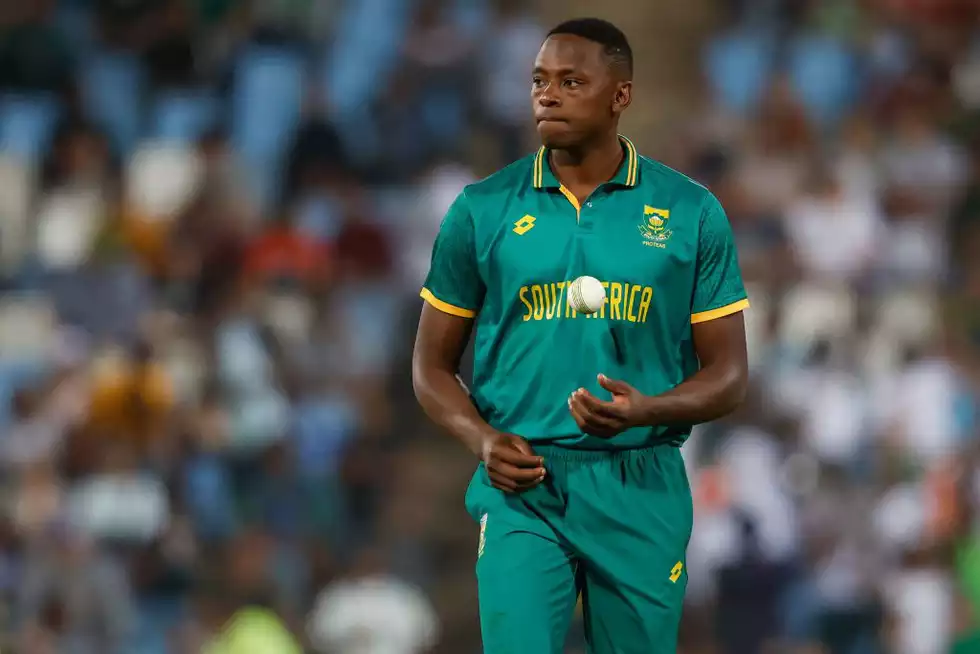Hearts were in mouths throughout South Africa for a prolonged period extending from Tuesday to Wednesday. “We have to find a replacement since Rabada is out injured,” Punjab Kings assistant coach Brad Haddin remarked incoherently and ambiguously on Tuesday in Guwahati. Hold on! What?
At 10.30 am (South Africa time) on Wednesday, CSA provided a brief statement in response to the query, saying, “Kagiso Rabada has returned home from the IPL due to a lower limb soft tissue infection.” Upon arriving in South Africa [on Sunday evening], the 28-year-old sought advice from a doctor and is currently under strict observation by the CSA medical team. It is not anticipated to have an impact on his preparation for the forthcoming T20 World Cup in the USA and the West Indies.”
Heave hooray! Nationwide, hearts filled with relief fell from unexpectedly relaxed throats. And not just among cricket fans. It is imperative that we acknowledge the fact that Rabada is far more than just a cricket player.
He is the most accomplished fast bowler in the nation and its most successful of the modern era; he is the attack’s brains, heart, and spirit. Only Mitchell Starc has taken more wickets at that level across all forms since Rabada’s November 2014 international debut in a T20I against Australia in Adelaide.
That seldom challenges the idea of what it is to be Rabada. He is the perfect example of a fast bowler who is also an artist. This is evident in everything he does, including his rasping intelligence, his visceral aggression (which once got him into hot water with the ICC), his balletic movements, and the icy hardness that shines in his eyes the same way it did in the eyes of Dennis Lillee, Malcom Marshall, Wasim Akram, and Allan Donald. Even cricket agnostics would have to admit that Rabada is one of the best fast bowlers in the game.
However, that is not his intention. The closest thing South Africa has to the gods cricket has made of Indian society is Rabada. His race in a nation where politics are fueled by race and are, naturally, deeply rooted in economics is at the heart of that claim. Politically speaking, after centuries of racial oppression, being black in contemporary South Africa means that your humanity is now acknowledged. With very few exceptions, being black in contemporary South Africa equates to being economically disadvantaged. One of such exceptions is Rabada. Still, he is as likely as any other Black person living in South Africa’s streets to experience bigotry. That is, until the bigots find out who he really is.
Rabada is not captured by even that. Although he has achieved success and created his own money, his parents, who were extraordinarily well-off for black South Africans at the time, set him on that route. Having attended an exceptional school and come from a middle-class background, he was free to focus on his passions, rugby and cricket, rather than worrying about how he was going to pay for new boots. It is well known that neither the child Makhaya Ntini nor the grandma who looked after him in the little rural village of Mdingi had enough money to buy boots. However, before we rejoice in Rabada’s reality as a step forward, remember that many of the young cricket players of today have experiences more akin to Ntini’s.
More than that, Rabada is the only player of African descent in the team for the T20 World Cup, which takes place in a month. There are also five brown players among the 15. However, this is South Africa, where the black population makes up over 80% of the total. The number of black and brown players who have represented South Africa in the 17 ODI and T20 World Cups has ranged from one to eight. However, following readmission in 1991, 93 out of 131 Test players have been white.
That is in spite of selection targets based on race. As of right now, each starting eleven must include a minimum of six black and brown players, with at least two of them being black. That is determined throughout the course of a season, but it will undoubtedly be challenging to accomplish at the T20 World Cup. It is also evident that the selection policy is ineffective.
With all that and more piled upon his thankfully wide shoulders, Rabada effortlessly transitions into his stunning bowling movement. For millions of people whose dreams and goals he will never meet, he is a beacon. In a predominantly black society that is in a frantic attempt to better the status of its black residents, he is a symbol of black excellence.
Therefore, any threat to his ability to play in the T20 World Cup will strike fear in the hearts of South Africans who love cricket and who want to see their nation become a better, more just place. That takes care of everyone.
Rabada stands out in strange settings as a result. similar to what was posted on Monday on the social media pages of the ruling African National Congress secretary general, Fikile Mbalula, who stated: “Only 1 African player selected in the Proteas Team for the upcoming T20 World Cup 2024 Team [sic].” unquestionably a reverse of the positive changes brought upon by transformation, and the national cricket team does not fairly represent all South Africans.”
There are issues with Mbalula’s remark, even after accounting for the fact that English is not his native tongue. No matter what race they are, all 15 members of the squad are Africans. What profits are included in the “reversal of the gains of transformation”? The aforementioned statistics demonstrate that, in terms of global impact, they have been little at most. On April 30, the team was also named. How long did Mbalula take to realise that false emptiness? However, there will be an election on May 29.
Unlike Mbalula, Ray Mali, the first black president of the CSA, is not a belligerent blowhard. However, he is disconnected. Mali expressed dissatisfaction on the national TV last week, claiming that the composition of the T20 World Cup team demonstrated that progress had “reversed.” And he lamented that it “is not going to work in a country like ours” to have the coach be the only selector.
When has change ever progressed noticeably on a worldwide scale? If Rob Walter weren’t white, would he not be the target of that kind of scrutiny? Mali, an 87-year-old senior player in the game, is a kind and considerate man. However, he resigned as president of the CSA in 2007, and the first Indian Premier League snatched away his time as interim head of the ICC. When Mali was at its centre, cricket was a radically different game at all levels and in all respects. Recall is a fitting second name for him.
Press inquiries regarding the issue of too much white skin—60% of the squad—sparked the existing board of CSA to take action. “The board received a report from the director of cricket [Enoch Nkwe] on the process and composition of the Proteas squad for the ICC T20 World Cup,” said a statement. The board confirmed its resolve to stay out of selection-related matters, but it did highlight that it was concerned about the squad’s composition not meeting the CSA targets.
“As with all CSA affiliates, it is our duty to maintain a strong talent pipeline so that all clubs fairly represent our community. The board acknowledges that the numerous programmes that have been undertaken over the years have not produced the intended outcomes, particularly with regard to developing black African cricket players for the highest levels of competition. Plans to accelerate the development of black African hitting talent and to guarantee a more representative group of players prior to the 2027 ODI World Cup being held in their homeland were also given by [Nkwe] to the board. The plans were approved by the board.”
In the unlikely event that Rabada gets disqualified from the competition, one of the backups, Lungi Ngidi, will probably take his spot. Notably, Ngidi is also black and a skilled fast bowler. One could argue that he ought to have added more players to the team, but Walter is relying on Anrich Nortje to rekindle the lightning-fast speed that has eluded him since his comeback in March following the equivalent of six months out due to a spinal stress fracture.
That is a valid point as well. The idea that the flame-throwing Nortje is not as similar in type to Rabada as the deftly adept Ngidi is also worth considering. Thus, Walter was spared a call in which Nortje and Ngidi were tied for votes. However, not much of that subtlety makes it through the controversy surrounding Walter and Nortje’s race.
When Faf du Plessis stated, “We don’t see colour,” in response to Temba Bavuma’s dismissal from the Test team in January 2020, he was rightfully criticised. If society is to advance, we must be able to see colour. We must cease perceiving things solely in grayscale, black and white.

